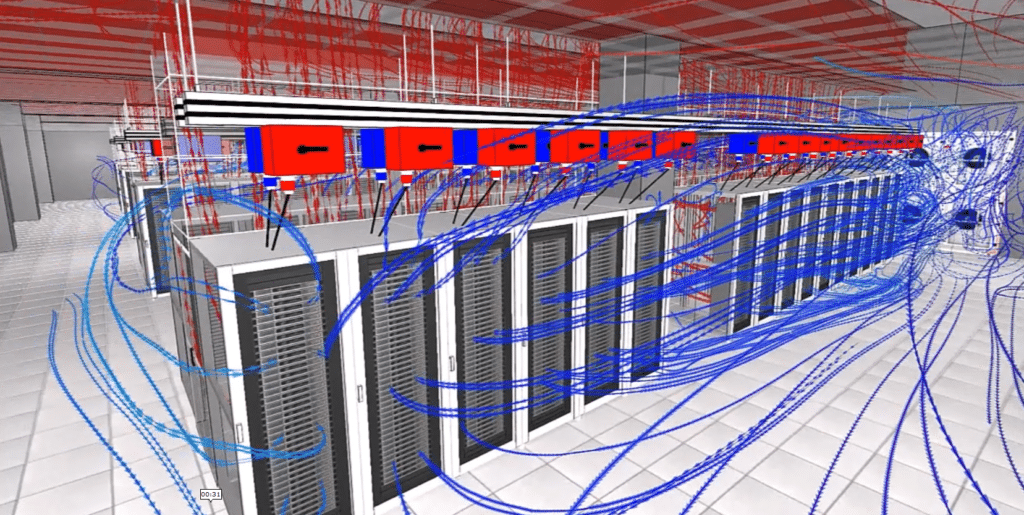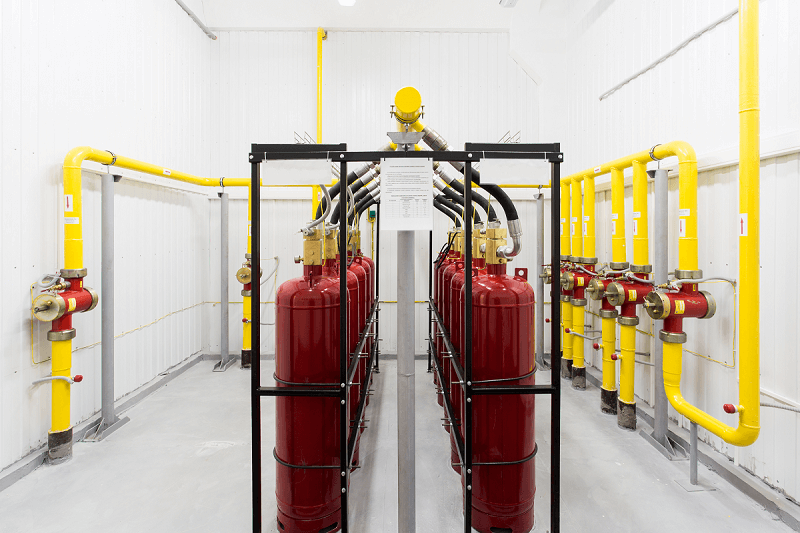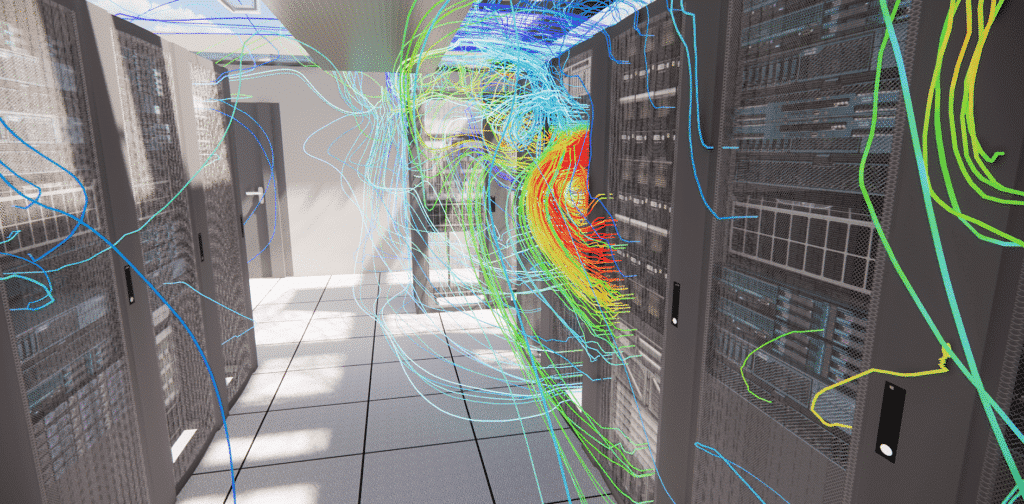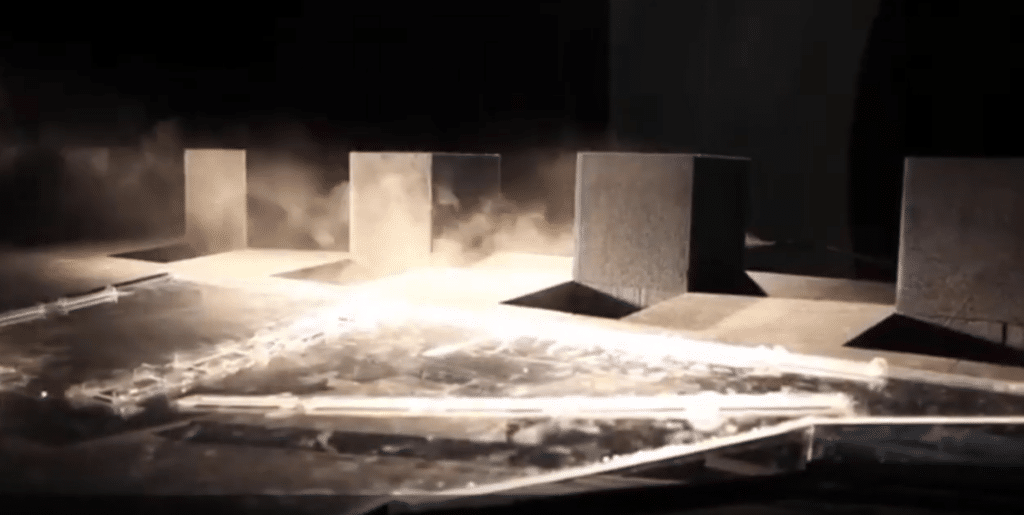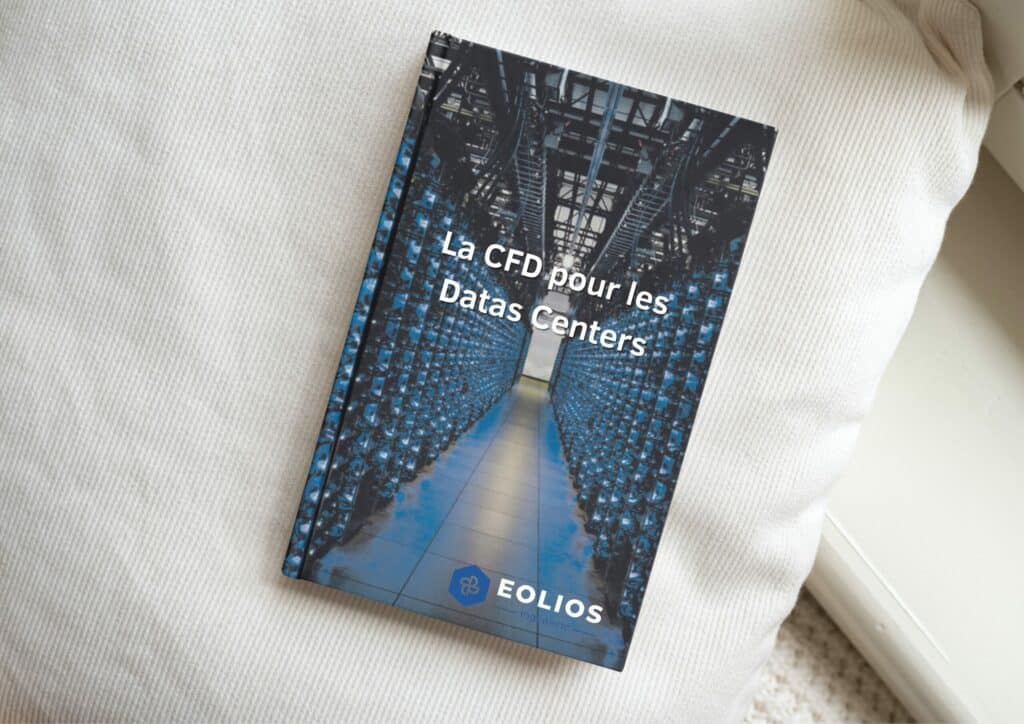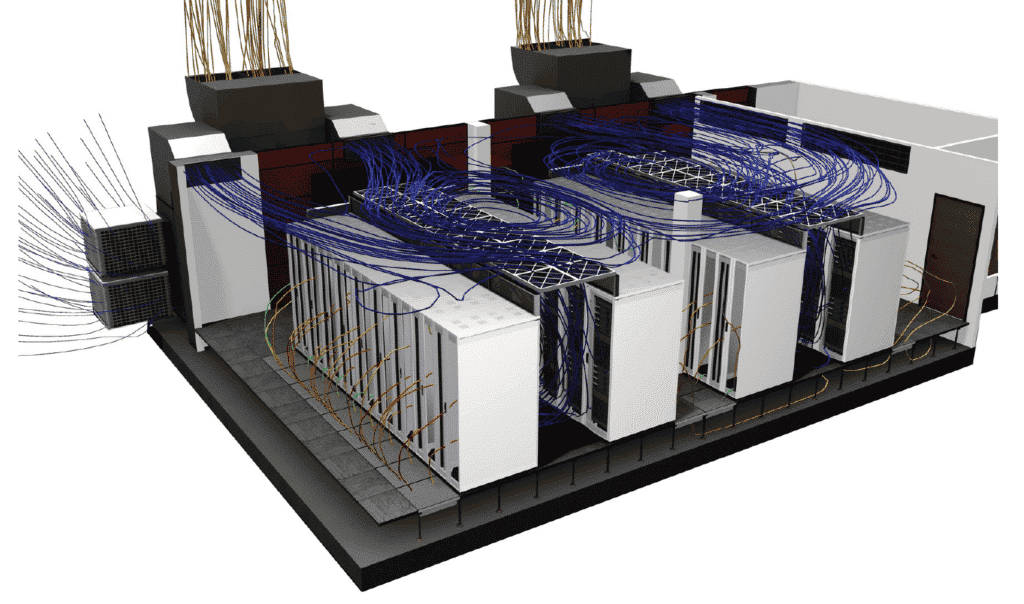Thermal study of technical premises
Thermal study of technical premises
Home » Data Center » Thermal study of technical premises
Thermal optimization in data center equipment rooms - UPS - TX - TS and Skid
We are experts in CFD studies and air-conditioning sizing for data center technical rooms.
- Study of thermal plumes
- Validation of maximum air temperature at equipment inlet
- Selection of equipment adapted to climatic conditions
- Study of critical failure scenarios
- Identification of bypass and recirculation air flows
- Energy optimization
- Validation of installation layout
- Optimizing placement and control of air handling systems
- Tailor-made solutions
Thermal optimization of data center equipment rooms.
Thermal optimization is a major issue in data center technical rooms. Indeed, proper management of the heat generated by IT equipment is essential to ensure its smooth operation and extend its lifespan. EOLIOS offersthermal optimization solutionsspecially designed for data centers.
Our fluid mechanics experts are able toanalyze your existing infrastructure and propose tailor-made solutions to improve the energy efficiency of your equipment, reduce cooling costs and ensure reliable, secure operation of your data center.
CFD for efficient thermal management in equipment rooms
For data centers, thermal management is an omnipresent concern. Traditionally, data center halls are organized into hot and cold aisles to optimize cooling of servers and equipment.
However, when it comes to technical premises, the situation is quite different. Each installation is unique, with its own specific constraints and configurations, which means that standardized cooling solutions are often inadequate.
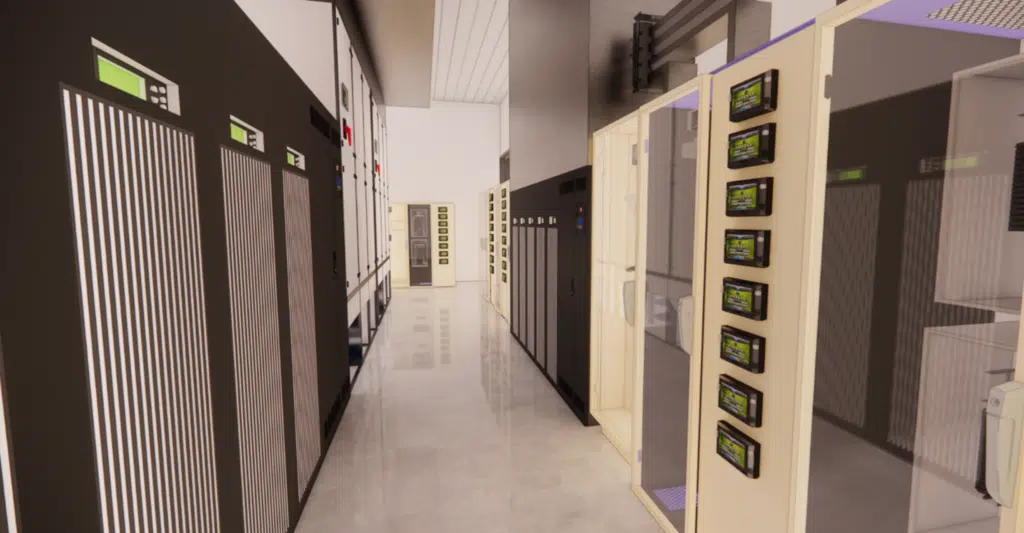
3D model of a machine room
At EOLIOS, we understand the crucial importance of efficient thermal management in data center equipment rooms. Thanks to our CFD expertise and customized approach, we can thoroughly analyze your infrastructure, identify hot spots, optimize air flows and design cooling solutions tailored to your specific needs.
With CFD, you can rest assured that your infrastructure will perform optimally, with maximum energy efficiency and reliability.
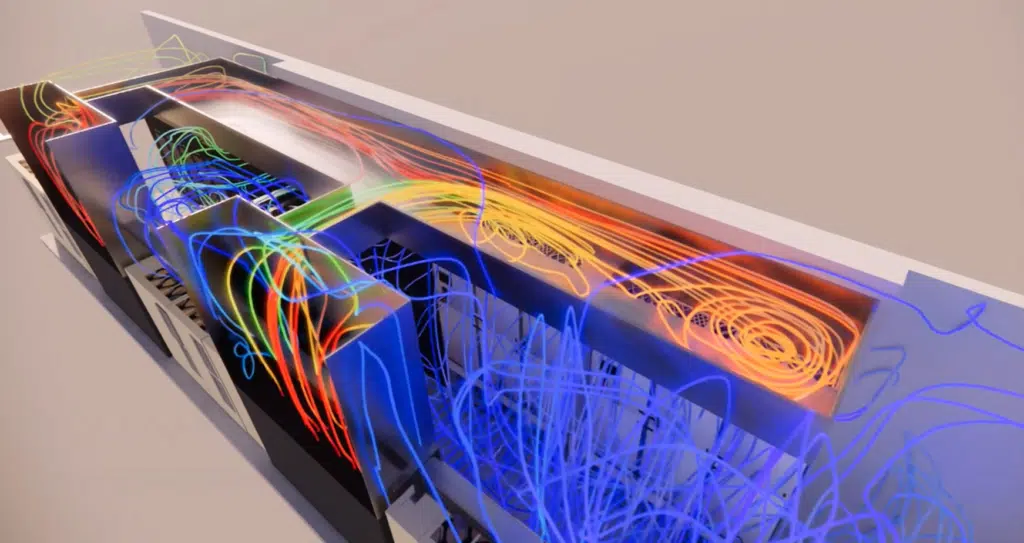
Power lines in equipment rooms - Colored by temperature
Customized, innovative thermal studies: a more in-depth approach at EOLIOS
Analysis of hot spots and overheating
A hot spot is an area where the temperature is abnormally high compared with the rest of the plant. These hot spots can be dangerous, as they can cause breakdowns, shorten equipment life and increase cooling costs. Thanks to our advanced thermal studies, we are able to pinpoint hot spots in your data center.
By analyzing air flows and temperature gradients, we can identify areas at risk and propose effective cooling strategies to eliminate them. Our aim is to help you maintain an even temperature throughout your data center, protecting your equipment and ensuring business continuity.
Analysis of looping phenomena
Analysis of looping phenomena is essential to ensure optimum cooling in data center technical rooms. Loopback occurs when a flow of warm air recycles through the cooling system, creating localized areas of overheating. At EOLIOS, we use advanced simulation tools to study air flows and detect potential looping points in your data center.
By analyzing air circulation patterns, we are able to propose design and equipment configuration solutions to prevent looping. Our aim is tooptimize fresh air distribution in your data center, avoiding recirculation zones and ensuring efficient heat dissipation. Thanks to our expertise in fluid mechanics and our CFD simulations, we can provide you with precise recommendations for minimizing the effects of looping and maintaining optimum cooling conditions in your technical premises.
System redundancy study
As part of an in-depth thermoaerodynamic study of data center equipment rooms, the assessment of cooling system redundancy (CRAH) is of paramount importance. System redundancy, i.e. the presence of back-up or duplicate systems to ensure continuity of operations in the event of failure, is essential to guarantee the availability and reliability of critical IT services.
By analyzing air distribution, cooling paths and thermal distribution in technical rooms, thermal-air studies helpidentify sensitive areas and design effective redundancy solutions.
Whether by duplicating cooling units or setting up back-up systems, these studies guarantee optimum resilience in the face of potential failures, and help to maintain the operational stability of data centers, even in critical situations.
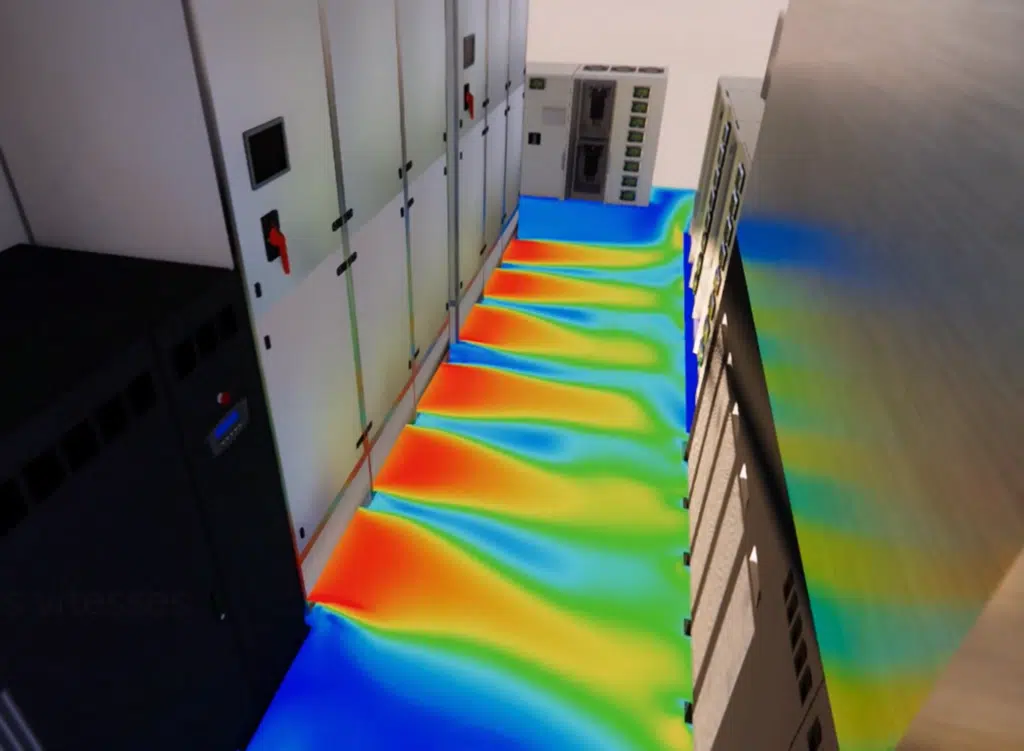
Air velocities at both CRAH outlets
"Is your data center protected against climate system failure during a heatwave? "
Our customized approach fully integrates these redundancy considerations into our thermal-air engineering studies, to provide our customers with robust, reliable solutions for their thermal management needs.
Design assistance
At EOLIOS, we can provide invaluable assistance in the design of your data center technical premises, including air conditioning systems, their location,overall layout and smoke extraction systems.
We understand that designing an efficient and functional data center requires a methodical approach and a thorough understanding of fluid thermodynamics.
Thanks to our CFD simulations, we can identify areas at risk of overheating, determine optimum locations for air-conditioning systems and design appropriate compartmentalization of air masses at different temperatures.
Whether by duplicating cooling units or setting up back-up systems, these studies guarantee optimum resilience in the face of potential failures, and help to maintain the operational stability of data centers, even in critical situations.
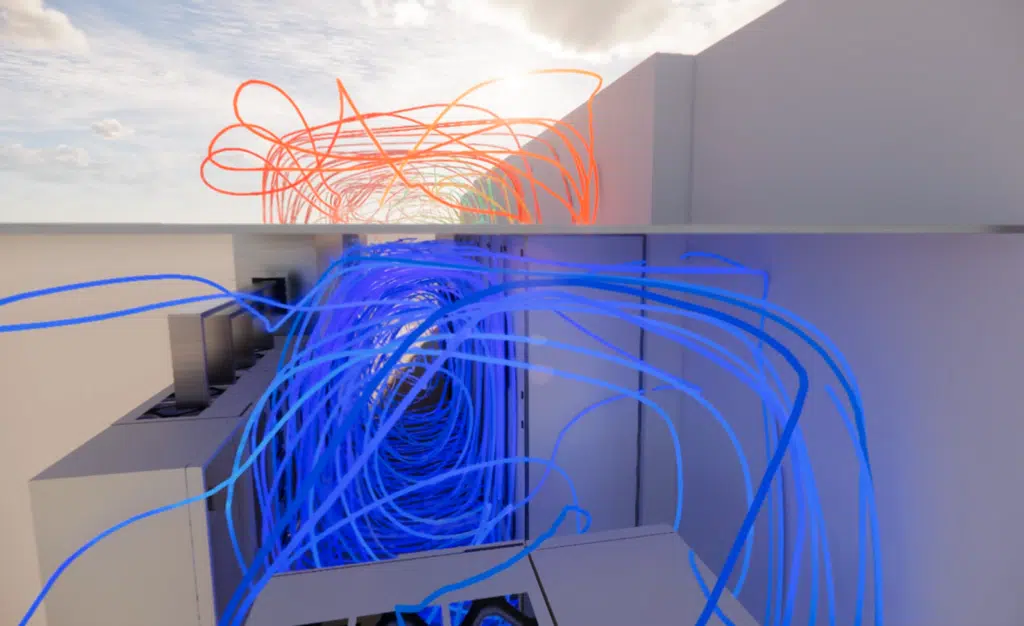
Compartmentalization of hot and cold air masses in a technical room
Our aim is tooptimize the thermal performance of your data center and technical rooms, ensuring even distribution of fresh air and minimizing energy losses. Working closely with you, we will provide specific recommendations for the design of your air conditioning systems, taking into account your requirements in terms of cooling capacity, redundancy and energy efficiency.
Smoke extraction, fire systems and detection study
The study of smoke extraction, fire systems and detection in data center technical rooms aims to determine the site’s specific needs in terms of fire safety, taking into account various parameters such as the size of the data center, equipment density, rack layout, construction materials used, air flows, and so on.
The studies must be carried out by fire safety experts and comply with the standards and regulations in force in the country where the data center is located. These studies enable us to precisely size specific fire-fighting or fire-starting installations.
The study of smoke extraction in a data center technical room is an essential aspect of fire safety. In the event of a fire, it is crucial to be able to quickly detect the smoke generated to ensure the safety of those present and maintain the proper operation of critical equipment.
A smoke extraction study involves analyzing the characteristics of the technical room, such as its surface area, height, equipment layout and any obstacles to air circulation. Using CFD simulation models, we are able to predict smoke propagation in the event of a fire,identify whether detection is correctly positioned , and size fire-fighting systems.
Simulation of detection and smoke extraction in a data center technical room during a fire outbreak
Find out more:
Our specific solutions for data centers :

CFD engineering for data centers
Find out more
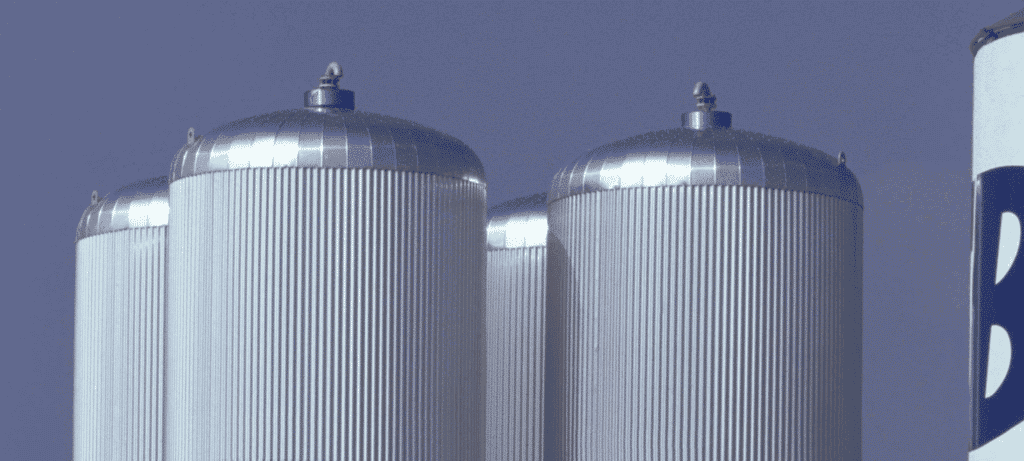
Thermal storage study
Find out more
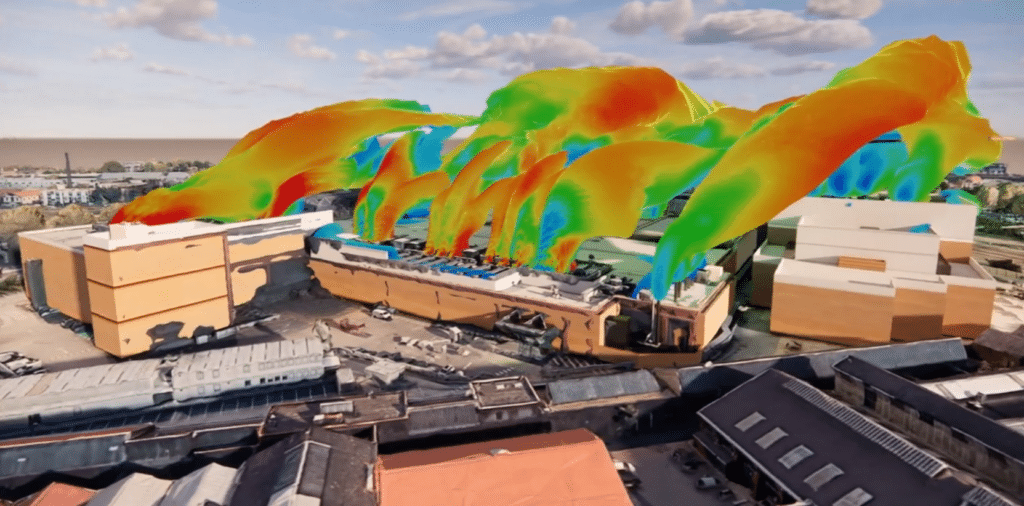
External CFD simulation for data center
Find out more
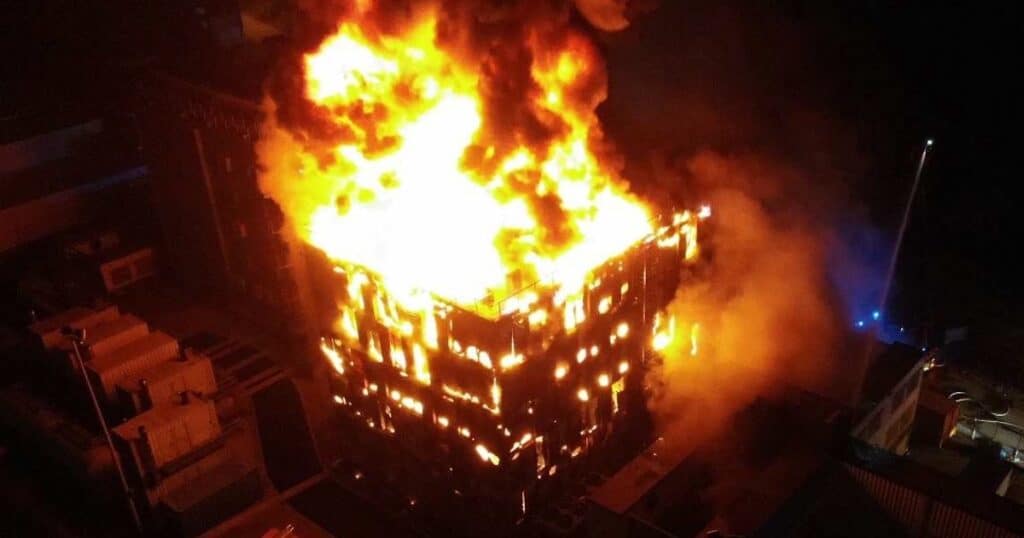
Data Center Fire Simulation
Find out more
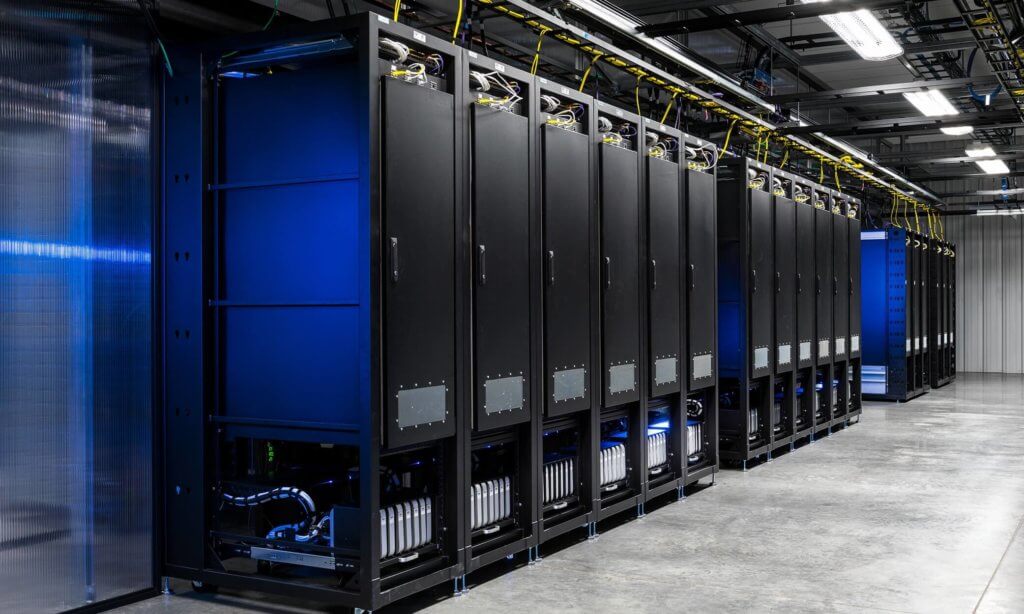
Thermal study of technical premises
Find out more
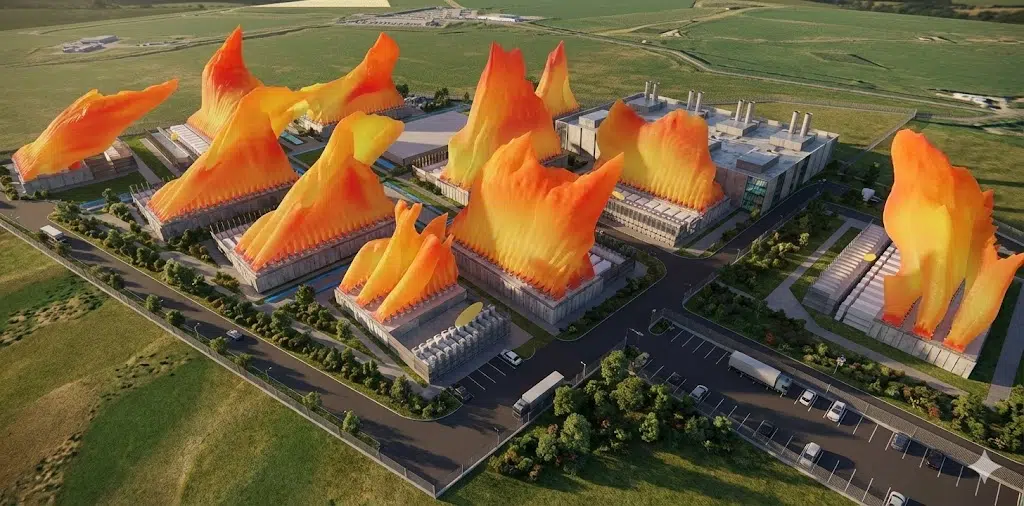
Urban heat island impact study for data centers
Find out more
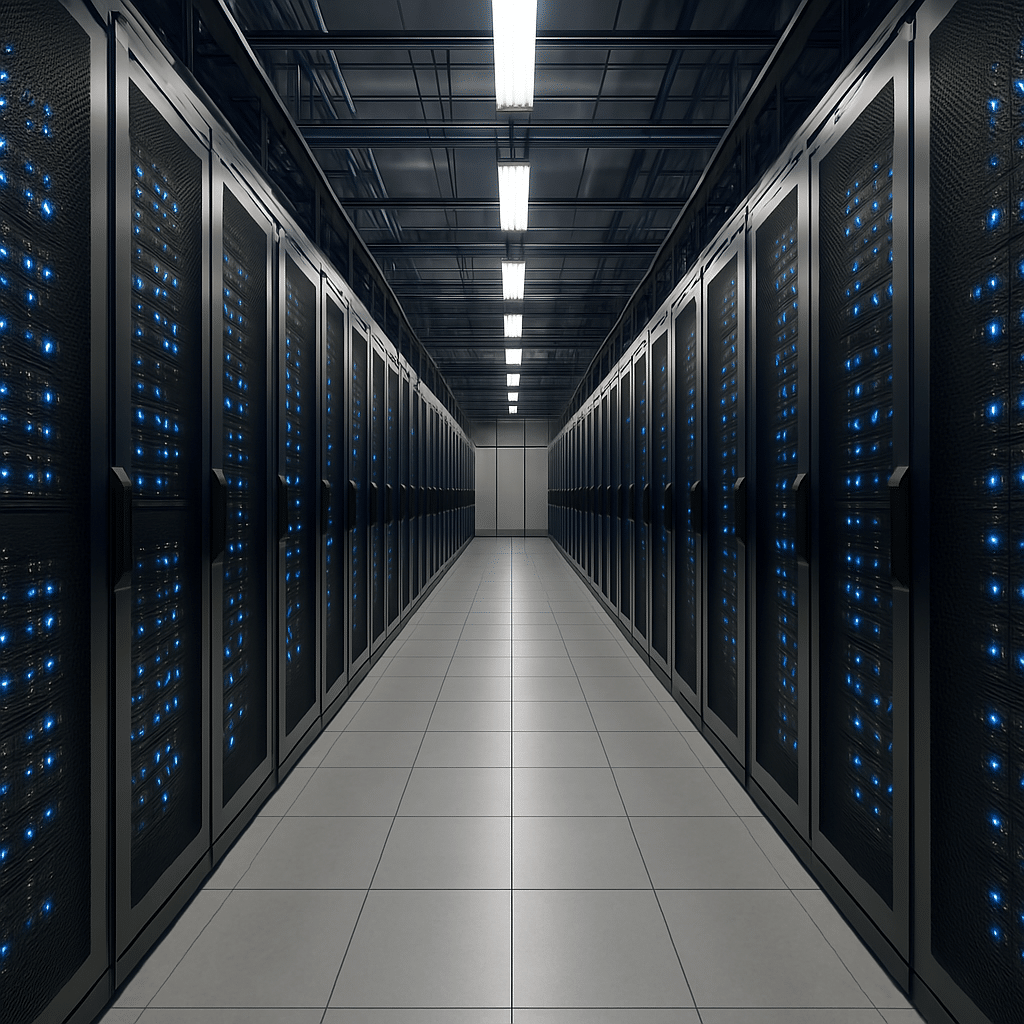
Audit, diagnosis and 3D modeling of existing data centers
Find out more
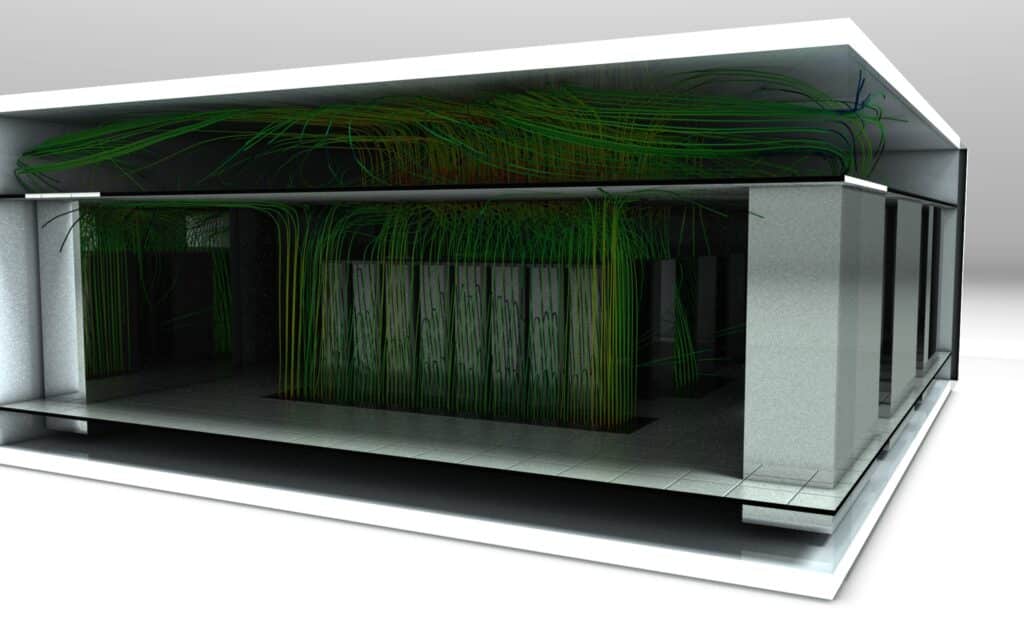
Designing your data center’s digital twin
Find out more
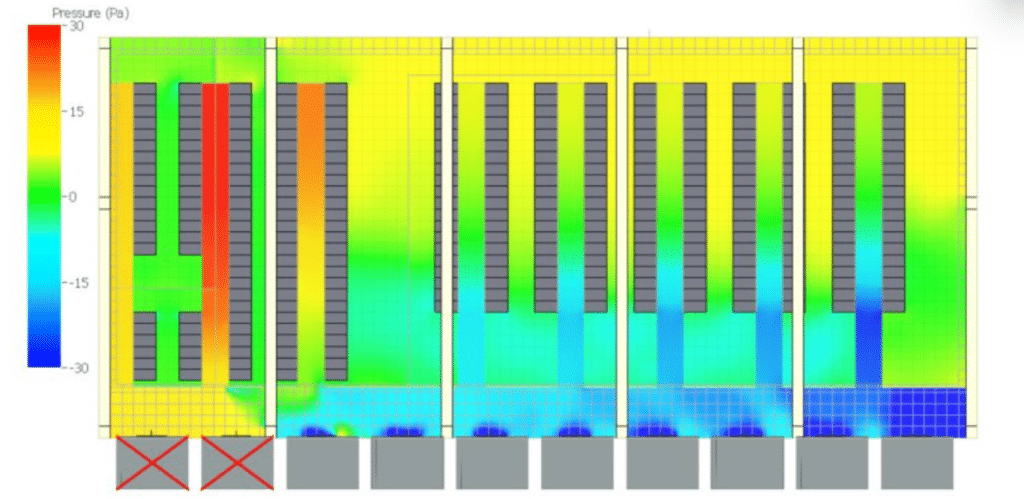
Energy optimization and PUE calculation for data centers
Find out more

Commissioning: study and CFD modeling of load benches
Find out more
Data center engineering
Initially created in France, EOLIOS Ingénierie is the benchmark thermal and aeraulic simulation consultancy for data centers in Europe and worldwide. The company supports operators, designers and project owners at every stage in the life of a data center: design, optimization, renovation or extension.
By combining cutting-edge scientific expertise, state-of-the-art simulation tools and in-depth knowledge of the data center ecosystem, EOLIOS Ingénierie is a trusted partner for ensuring the availability, security and energy performance of IT infrastructures, while anticipating sustainability issues.
EOLIOS
PARIS – LONDON – MILAN – MUNICH – MADRID – WARSAW – CASABLANCA – UNITED ARAB EMIRATES – USA

